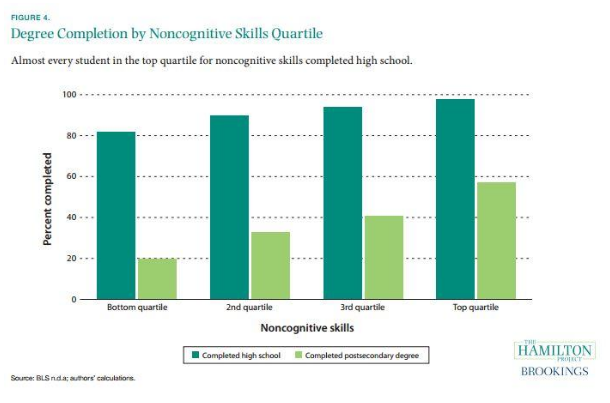Goodbye, maths and English. Hello, teamwork and communication?

Making the grade: Academic results won't necessarily land you the job anymore Image: REUTERS/Francois Lenoir

Get involved with our crowdsourced digital platform to deliver impact at scale
Stay up to date:
Education
It’s no longer enough to fill your CV with impressive grades. Employers are looking beyond qualifications to figure out what other skills their candidates have.
Cognitive skills in topics like maths and English have long been used as to measure the calibre of a job candidate. But a report by The Hamilton Project, an economic think-tank, says that non-cognitive skills are also integral to educational performance and success at work – and are becoming increasingly so.
Non-cognitive skills are your “soft skills”: things like how well you can communicate, how well you work with others, how well you lead a team and how self-motivated you are.
The report says that, to a certain extent, those soft skills inevitably depend on people's personality: “some individuals have an inherently easier time getting along with others” for example. They are also closely linked to the level of education a person has received, as well as that of their parents.
However, these skills can also be taught, says the report.
Not enough skills
The Hamilton Project referenced a survey of hiring managers in the US, which suggests that they are just as worried about finding people with the right non-cognitive skills as with more traditional and measurable abilities.
“While fewer than 20% of hiring managers said that recent graduates lacked the math skills needed for the work, more than half said that recent graduates lacked attention to detail. About equal shares of hiring managers saw deficiencies in writing proficiency and communication—the cognitive and non-cognitive aspects, respectively, of a single skill. About a third of hiring managers said recent college graduates lacked data analysis and teamwork skills,” says the report.
Why is this important?
The Hamilton Project argues that non-cognitive skills are crucial for the labour market for four key economic reasons.
1. Today’s jobs demand more non-cognitive skills than they did in the past.
This graph shows that tasks that involved working with or for people – requiring better non-cognitive skills - are substantially more important today than they were in the 1980s and 1990s. Tasks such as social skills and service skills have grown by 16 and 17% respectively, while tasks that require high levels of maths have only grown by 5%.

2. The labour market increasingly rewards non-cognitive skills.
These charts show the link between salary and both types of skills.

3. And the more likely they are to be in full time employment.
These two bar charts show how, as non-cognitive and cognitive skills go up, so do earnings and the probability of full-time employment. This is unsurprising, but the data also shows how non-cognitive skills have become much more important over time.

4. Those with fewer non-cognitive skills are being left behind.
This final chart shows that almost all of those who are in the top 25% in non-cognitive skills complete high school, and more than half complete a degree.

Leaving qualifications behind
Some companies are indeed bypassing qualifications altogether and using their own methods of assessing a candidate. In 2015 the global accountancy firm Ernst & Young said that they were going to use their in-house assessment programme and numeracy tests. “At EY we are modernising the workplace, challenging traditional thinking and ways of doing things. Transforming our recruitment process will open up opportunities for talented individuals regardless of their background and provide greater access to the profession,” says the company.
The World Economic Forum Future of Jobs report argues that emotional intelligence, creativity, and people management will be among the top skills needed for jobs in 2020. “Change won’t wait for us: business leaders, educators and governments all need to be proactive in up-skilling and retraining people so everyone can benefit from the Fourth Industrial Revolution,” the report states.
Don't miss any update on this topic
Create a free account and access your personalized content collection with our latest publications and analyses.
License and Republishing
World Economic Forum articles may be republished in accordance with the Creative Commons Attribution-NonCommercial-NoDerivatives 4.0 International Public License, and in accordance with our Terms of Use.
The views expressed in this article are those of the author alone and not the World Economic Forum.
Related topics:
The Agenda Weekly
A weekly update of the most important issues driving the global agenda
You can unsubscribe at any time using the link in our emails. For more details, review our privacy policy.
More on EducationSee all
Natalia Kucirkova
April 17, 2024
Morgan Camp
April 9, 2024
Scott Doughman
March 12, 2024
Genesis Elhussein and Julia Hakspiel
March 1, 2024
Jane Mann
February 28, 2024
Malvika Bhagwat
February 26, 2024






